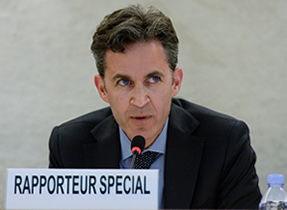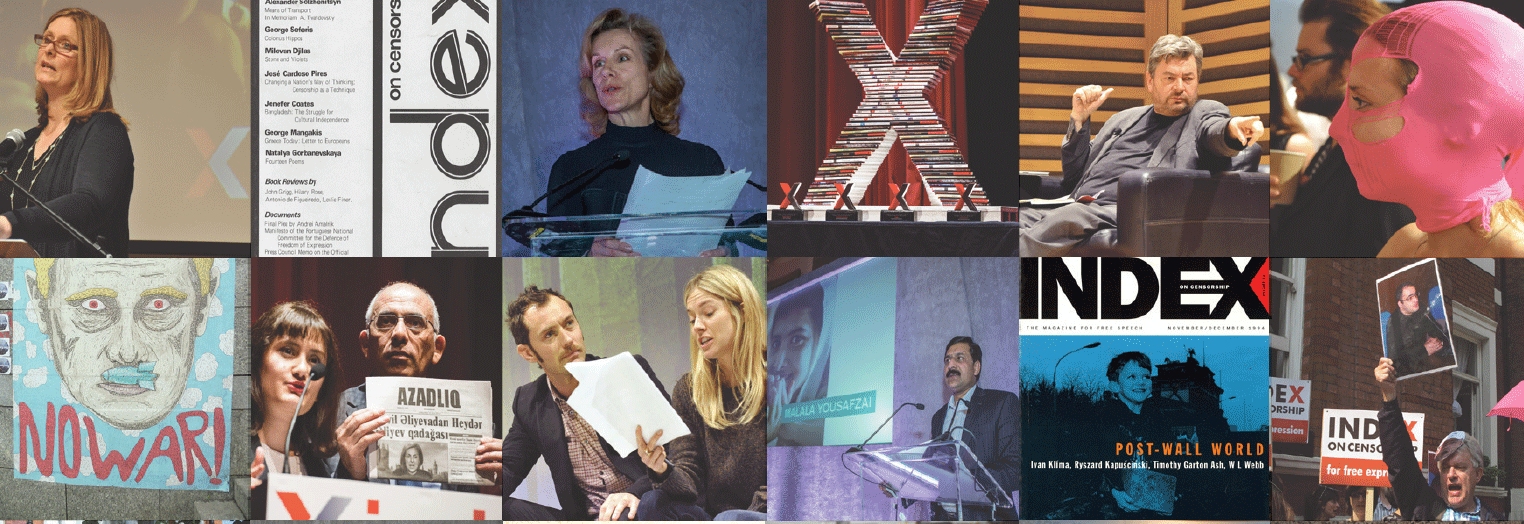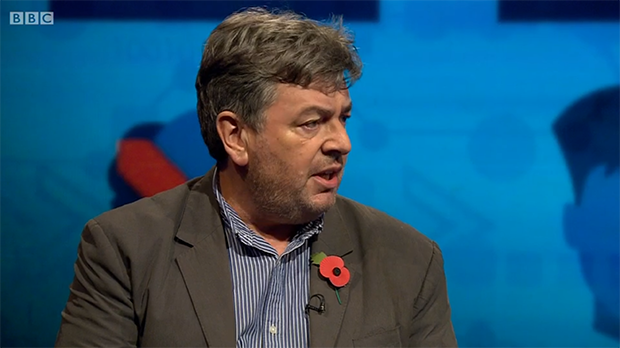4 Dec 2015 | Asia and Pacific, Japan, mobile, News and features

David Kaye, UN Special Rapporteur on the promotion and protection of the right to freedom of opinion and expression
The UN’s principal global monitor of freedom of expression, David Kaye, was due to visit Japan between 1 and 8 December. In mid-November, the Japanese government cancelled the trip.
Kaye said of the cancellation: “The Japanese government indicated that relevant interlocutors would be preoccupied with the budget process. That was disappointing to hear, particularly since we had been organising a broad set of meetings with officials, civil society, academic experts, journalists and others.”
During the visit, Kaye planned to address basic aspects of freedom of expression, including the public’s right to access information, the freedom and protection of independent media, online rights and restrictions on marginalised communities.
He told Index: “We would have highlighted what appear to be some very positive aspects of the freedoms Japanese people enjoy online, for instance, and we would have also raised questions about the Act on Specially Designated Secrets and concerns we’ve been seeing related to pressures on the media.”
The Act on Specially Designated Secrets was implemented in 2013, offering protection to state secrets and tightening penalties on leaking intelligence. The Human Rights Committee has expressed concerns about the act, stating it contained a “vague and broad definition of the matters that can be classified as secret and general preconditions for classification and sets high criminal penalties that could generate a chilling effect on the activities of journalists and human rights defenders”.
“We have studied the Act and wanted to ask officials about the interpretation of some provisions and implementation of the Act overall,” Kaye said. “For instance, we have heard numerous concerns about the way in which the Act may implicate the public’s access to information, the way in which it may punish whistleblowers, the barriers it may set up to a free media seeking information of public interest.”
Had the visit gone ahead, Kaye said he would have come with questions, addressed them to Japanese officials and non-government actors, and the UN would have published the findings.
The cancellation of the visit does raise concerns over Japan’s commitment to freedom of expression, but Kaye remains optimistic. “My hope is that the Japanese government is indeed committed and will reschedule the visit at the earliest opportunity, rather than late 2016, as they have suggested.”
24 Nov 2015

Since 1972, our work has given a voice to those who face imprisonment, torture and even death for speaking out.
Your money helps us support individuals like Mouad Belghouat, a Moroccan rapper, whose concerts have been repeatedly shut down by authorities over his criticism of corruption. Or Rafael Marques de Morais, who faces the constant threat of jail because of his investigations into Angola’s blood diamonds industry. Or Maryam al-Khawaja, a Bahraini activist for whose release from jail Index successfully campaigned. Or Dina Meza, who lives under constant fear and threats because of her work as an investigative journalist in Honduras.
Index works tirelessly, exposing these stories online, in our magazine and in the press; supporting the individuals who battle censorship and advocating for free speech in the UK.
“I could not look into my children’s eyes and tell them I can do nothing about the situation, because to do nothing would be far worse than the threats, beatings or bullets of the police and the military.”
Dina Meza
Be One
Free speech is not free. We rely on the generous support of donors and supporters to enable our work. By giving over £5,000 a year and joining Index Advocates you will receive:
• Recognition in our quarterly magazine and annual report
• Annual subscription to our magazine
• Invitations to all of Index’s cutting edge events
• Tickets to Index’s keynote event, the annual Freedom of Expression Awards
• Tickets to our new annual event, the Free Expression Award Winners’ Dinner.
If you would be interested in learning more about becoming an Index Advocate please contact Helen Galliano:
[email protected] or 0207 260 2660
If you are a US donor and would like more information about tax deductible charitable giving to Index, please contact [email protected]. Index works with CAF American Donor Fund.
“I have been privileged to be associated with Index on Censorship for some years, during which time I have been humbled over and over again by meeting the sort of people for whom Index on Censorship is an absolute lifeline – people who risk their lives and liberty daily to tell the truth.”
Simon Callow, Index Patron
2 Nov 2015 | Academic Freedom, Europe and Central Asia, mobile, News and features, United Kingdom

One of the truly great things about being a student used to be the exposure university life gave you to all sorts of views — absurd and otherwise — and being able to decide for yourself what to make of them. Students were once known for their dedication to free speech and academic freedom, epitomised by the Free Speech Movement at the University of California, Berkeley, 1964-65.
In 2015, students are more renowned for the practice of trying to ban anyone they believe to have dangerous views in order to protect fellow tutees, whether it’s removing the Sun from the shelves or refusing airplay to Robin Thicke’s Blurred Lines. We witnessed this tendency most recently with the petition to ban Germaine Greer from speaking at Cardiff University because of her “misogynistic views towards trans women”.
Index on Censorship chairman David Aaronovitch appeared on BBC Newsnight on Thursday to debate free speech at universities with Toke Dahler, a representative of Leeds University student union. Dahler said that “it’s up to students” to decide where the threat lies, and it is the student union’s responsibility to then “make sure that students feel safe and feel welcome”.
For Aaronovitch, student unions should be places of lively debate and discussion, rather than places where students are “hermetically sealed away behind a form of intellectual rampart within which they can feel safe”. The problem with Dahler’s view, said Aaronovitch, is one of definition. What do we mean by safe? Who exactly feels unsafe? And what do they feel unsafe from?
The full interview is available on BBC iPlayer until 28 November. You can watch it here (starts at 27:40).
19 Oct 2015 | Asia and Pacific, China, mobile, News and features

(Photo illustration: Shutterstock)
With UK-China relations warming, the president of the People’s Republic of China, Xi Jinping, will pay a state visit to the UK from 20-23 October. The UK government hopes the visit will help finalise multibillion-pound deals for Chinese state-owned companies to contribute to the building of two British nuclear power plants.
Many — including the Dalai Lama — are concerned that Prime Minister David Cameron and Chancellor George Osborne are putting the desire for profit above concern for human rights.
Xi may be staying in luxury at Buckingham Palace during his visit, but here are just five examples of how respect for free speech in China doesn’t get past the front door:
1. Locking up artists
The soccer-loving Chinese president is due to visit Manchester City Football Club’s stadium with Cameron during his visit. But will he make time for the new exhibition by Chinese artist and dissident Ai Weiwei in London? We won’t hold our breath.
The major retrospective of the artist’s work is currently on show at the Royal Academy of Arts. Ai — whose work is famous for addressing human rights abuses and corruption — has been harassed, beaten, placed under house arrest and imprisoned.
The current London exhibition almost didn’t go ahead as the British Embassy in Beijing turned down Ai’s request for a business visa in connection with his criminal conviction for tax fraud — an accusation he denies. British Home Secretary Theresa May eventually overturned the embassy’s decision, but only after a mass public outcry. This shouldn’t be the height of the British government’s efforts to address Chinese human rights abuses.
2. The use of online “opinion monitors”
China’s Terracotta Army, the 8,000-strong force of sculptures depicting warriors and horses, was purpose-built to protect emperor Qin Shi Huang, who died in 210 BC, in his afterlife. In the modern day, China’s army of “opinion monitors”, which has been purpose-built to protect China’s current leaders from criticism and dissent, dwarfs anything the Qin dynasty could muster.
Last year, Index on Censorship reported that the Chinese government is expanding its censorship and monitoring of web activity with a new training programme for an estimated two million flies on the firewall.
China’s hundreds of millions of web users increasingly use blogs to condemn the state, but posts are routinely deleted by government employees. In 2012, monitors banned more than 100 search terms relating to the 25th anniversary of the Tiananmen Square protest of 1989 and even shut down Google services.
3. Banning books
Often overshadowed by China’s internet censorship, we shouldn’t forget that Chinese authorities have a rich history of restricting free expression in literature. In 1931, Lewis Carroll’s Alice’s Adventures in Wonderland was banned for its portrayal of anthropomorphised animals for fear children would regard humans and animals as equal. During Chairman Mao Zedong’s Cultural Revolution, all aspects of arts and culture had to promote and aid the revolution. Libraries full of historical and foreign texts were destroyed and books deemed undesirable were burned.
The country’s post-Mao transition has been marked by a commitment to “modernising”. While the Chinese populace has access to more information than ever before, their leaders’ continuation of banning books on grounds of non-conformity and deviance are anything but modern.
Publications which are still banned — often for perceived politically incorrect content — include the memoirs of Li Rui, a retired Chinese politician and dissident who caused a stir in the CCP by calling for political reform; Lung Ying-tai’s Big River, Big Sea about the Chinese Civil War; and Jung Chang’s best-selling Wild Swans, a history that spans a century, recounting the lives of three female generations in the author’s family.
4. Detaining activists
Recent years have been marked with an intensification of the crackdown on dissent. On 6 March 2015, just days before International Women’s Day, the Chinese government detained a number of high-profile feminist activists. They were accused of creating a disturbance and, if convicted, could have received three-year prison sentences.
The women had been linked to several actions over the years which highlight issues such as domestic violence and the poor provision of women’s toilets, obvious embarrassments to the authorities.
As a result of their detention, China’s small, but increasingly vocal feminist movement was dealt a heavy blow. Demonstrations were cancelled and debate was effectively silenced. Five of the activists were released fairly quickly, but five more were in prison until 13 April, with two being denied treatment for serious medical conditions while in custody.
5. Repressing Uyghur Muslims
China continues to persecute the largely Muslim minority Uyghurs of Xinjiang. A tough system of policies and regulations deny Uyghurs religious freedom and by extension freedom of expression, association and assembly.
The abuse of national security and anti-terror laws to persecute Uyghurs and further deny them freedom of expression was highlighted in the recent ban by the Chinese authorities on 22 Muslim names in Xinjiang in an apparent attempt to discourage extremism among the region’s Uyghur residents. Many children were barred from attending school unless their names were changed.
Ryan McChrystal is the assistant online editor at Index on Censorship




